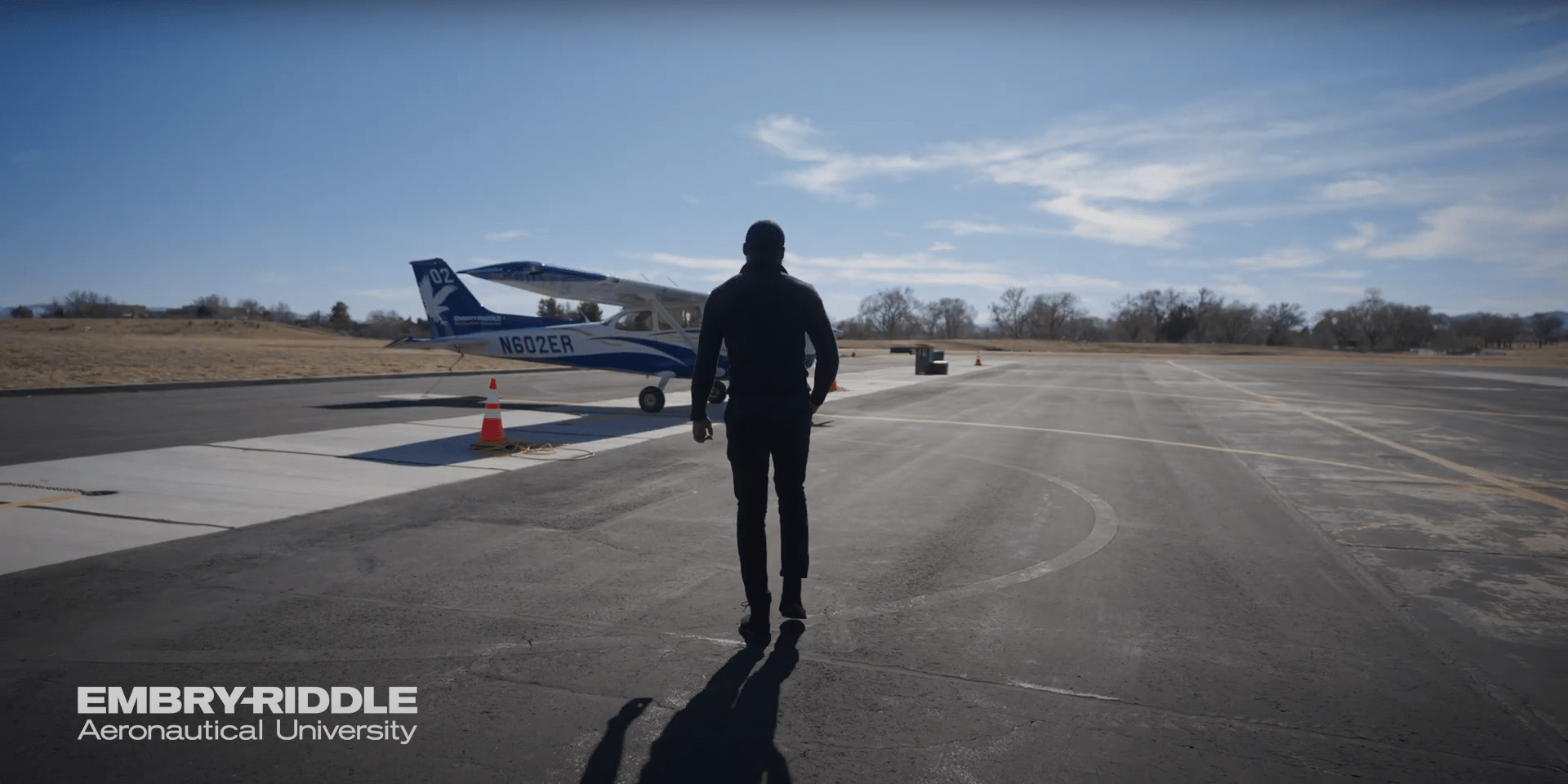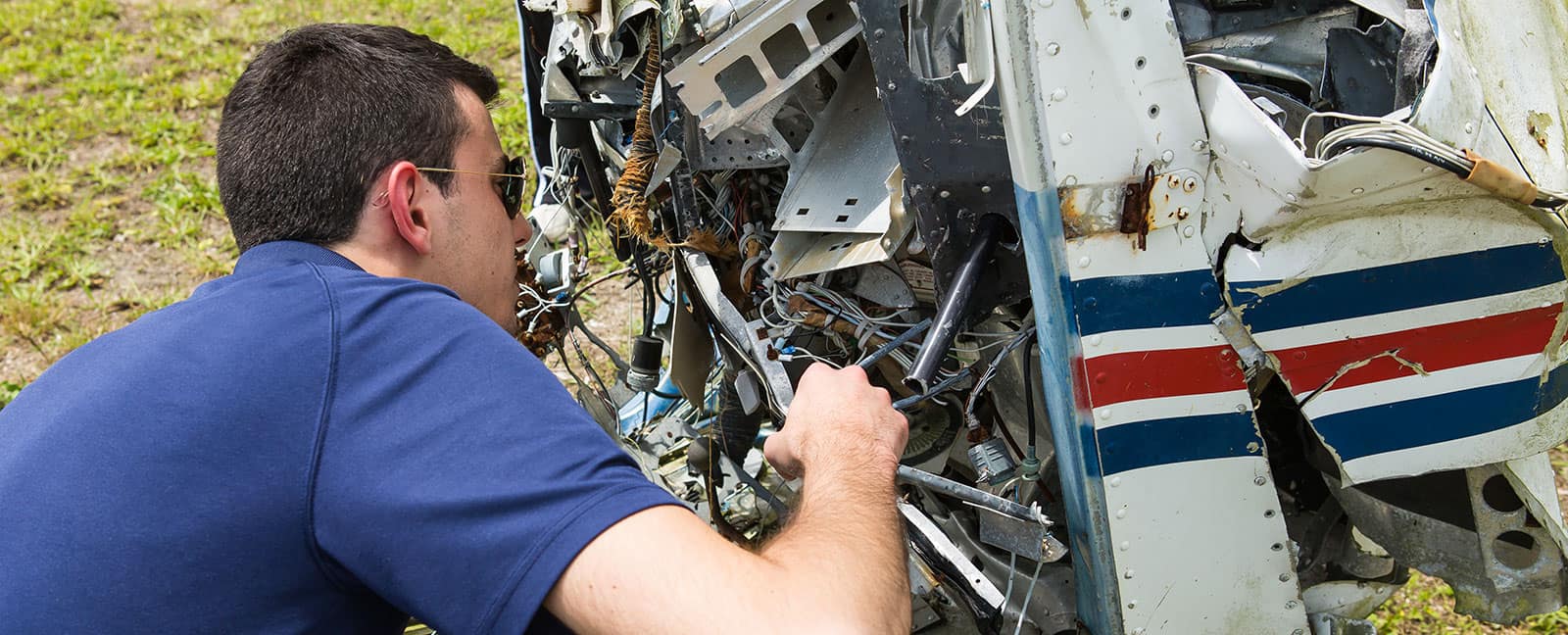
Bachelor of Science in
Interdisciplinary Studies
The B.S. in Interdisciplinary Studies is designed to nurture critical thinkers who understand the connections between science, technology and humanity.
About the Bachelor of Science in Interdisciplinary Studies
The Bachelor of Science in Interdisciplinary Studies is specifically designed for students who have a wide range of interests or have explored multiple degree programs and found several appealing. This program offers students access to state-of-the-art labs, cutting-edge technology and the guidance of dedicated, industry-leading professors.
As students tailor their Interdisciplinary Studies degree to their individual interests, they are presented with the opportunity to immerse themselves in academic experiences and hands-on learning, providing them with the competitive edge needed to pursue esteemed positions with leading employers.
Why You Should Study this Degree
Interdisciplinary Studies explores how different academic subjects connect to gain a better understanding of complex topics or issues. A degree in interdisciplinary studies may be for you if you:
- Enjoy combining innovation with multiple passions
- Have a variety of unique interests
- Want to prepare for diverse career opportunities
Student Learning Outcomes
Interdisciplinary research opportunities you will have while pursuing a degree:
- Communicate disciplinary concepts through written, digital and oral presentations for technical and non-technical audiences.
- Evaluate problems or challenges within a career field related to their minors.
- Synthesize information from various disciplines related to their minors into a comprehensive understanding.
- Use digitally enabled technology to interpret data.
Interdisciplinary Studies Career Opportunities
Careers and Employers
Embry‑Riddle Interdisciplinary Studies graduates are set to enter the workforce with a placement rate of 100% within a year of graduation, often continuing in areas such as:
- Aviation
- Aerospace
- Business
- Graduate Studies
- Law School
- The U.S. Military
Interdisciplinary degree graduates tend to enter the industry with companies such as:
- American Airlines
- Lockhead Martin
- NASA
- Republic Airlines
- Space X
- The White House
Interdisciplinary Studies Salary Information
Graduates with a Bachelor of Science in Interdisciplinary Studies tend to receive competitive salaries, with an average income of $117,100 annually, as of 2022.
DETAILS
This offering is available at the following campuses. Select a campus to learn more.
About Interdisciplinary Studies at the Daytona Beach, FL Campus
The B.S. in Interdisciplinary Studies at the Daytona Beach Campus was developed to meet the needs of corporate leaders. It allows students to customize their course of study and choose three minors or two minors and an area of focus. The program covers a range of courses, including Aviation/Aerospace Foundation, Management Foundation, Global Focus, Philosophical Perspectives, Enhanced Communication/Humanities, Research Methods, a Capstone Experience and open electives.
The program aims to produce entrepreneurial graduates who can think across disciplines, make innovative connections, adapt to changing career landscapes and become leaders in their respective fields.
Interdisciplinary Studies Information
- Credits: 120
- Online or In-Person: In-Person
- Capstone: Senior Capstone (3 credits)
Helpful Links
- Tour our Daytona Beach Campus
- Discover the College's Faculty
- Explore the Fields of Study: Applied Science & Aviation & Computers & Technology & Engineering & Security, Intelligence and Safety & Space
- Find Related Clubs & Organizations
Student Learning Outcomes
Students will:
- Evaluate problems or challenges within a career field related to their minors.
- Use digitally-enabled technology to interpret data.
- Apply meaningful interdisciplinary research to a capstone project or document that correctly uses an approved documentation system.
- Communicate disciplinary concepts through written, digital, and oral presentations for technical and non-technical audiences.
- Synthesize information from various disciplines related to their minors into a comprehensive understanding.
General Education Requirements
For a full description of Embry‑Riddle General Education guidelines, please see the General Education section of this catalog. These minimum requirements are applicable to all degree programs.
| Communication Theory and Skills | 9 | |
| Humanities - Lower level | 3 | |
| Social Sciences - Lower level | 3 | |
| Humanities or Social Sciences - Lower or Upper level | 3 | |
| Humanities or Social Sciences - Upper level | 3 | |
| Computer Science | 3 | |
| Mathematics | 6 | |
| Physical and Life Sciences | 6 | |
| Total Credits | 36 | |
Interdisciplinary Core Requirements
| Aviation/Aerospace Foundation | ||
| Select one of the following: | 3 | |
AS 120 | Principles of Aeronautical Science | |
SP 110 | Introduction to Space Flight | |
SS 130 | History of Aviation in America | |
Private Pilot Certificate | ||
| Management Foundation | 3 | |
BA 201 | Principles of Management | |
| Global Focus | ||
| Select two of the following: | 6 | |
BA 335 | International Business | |
BA 427 | Management of Multicultural Workforce | |
GCS 300 | International Conflict Resolution | |
GCS 302 | Gender Security | |
GCS 306 | Theories of Nations and Nationalism | |
GCS 322 | Modern Russian History | |
GCS 326 | Russian-U.S. Relations | |
GCS 333 | U.S. - Asian Relations | |
GCS 334 | Contemporary Africa and the World | |
GCS 336 | The Modern Middle East in World Affairs | |
GCS 337 | Globalization and World Politics | |
GCS 363 | Inter-American Relations | |
HU 300 | World Literature | |
HU 323 | Arab Culture | |
HU 341 | World Philosophy | |
HU 345 | Comparative Religions | |
HU 363 | Communication and Society | |
SS 325 | International Studies | |
| Study Abroad course (s) with permission of advisor | ||
| Philosophical Perspectives | ||
| Select one of the following: | 3 | |
| Cannot duplicate courses from any other category | ||
HU 330 | Values and Ethics | |
HU 341 | World Philosophy | |
HU 345 | Comparative Religions | |
| Enhanced Communication/Humanities | ||
| Select three of the following: | 9 | |
| Cannot duplicate courses from any other core category | ||
| One course must be an Upper Level Communications course | ||
COM 319 | Advanced Speech | |
COM 320 | Mass Communication Law and Ethics | |
COM 322 | Aviation and Aerospace Communication | |
COM 325 | Mass Media and Current Events | |
COM 326 | Social Media Communication | |
COM 350 | Environmental Communication | |
COM 360 | Public Relations | |
COM 362 | Communication and Organizational Culture | |
COM 412 | Advanced Technical Writing | |
COM 415 | Nonverbal Communication | |
COM 460 | Crisis Communication | |
COM 399 | Special Topics in Communication | |
COM 475 | Video Production | |
COM 499 | Special Topics in Communication | |
HU 300 | World Literature | |
HU 305 | Modern Literature | |
HU 310 | American Literature | |
HU 321 | Mythology | |
HU 325 | Exploring Film | |
HU 330 | Values and Ethics | |
HU 332 | Cross-Cultural Communication | |
HU 335 | Technology and Modern Civilization | |
HU 338 | Interdisciplinary Explorations | |
HU 341 | World Philosophy | |
HU 345 | Comparative Religions | |
HU 355 | Creative Writing | |
HU 363 | Communication and Society | |
HU 399 | Special Topics in Humanities | |
HU 415 | Nonverbal Communication | |
HU 499 | Special Topics in Humanities | |
| Research Methods | ||
| Select one of the following: | 3 | |
COM 270 | Communication Research Theory and Methods | |
COM 415 | Nonverbal Communication | |
HF 300 | Human Factors I: Principles and Fundamentals | |
HU 415 | Nonverbal Communication | |
MK 355 | Data Driven Decision Making | |
PSY 323 & 323L | Research Design and Research Methods Laboratory | |
| Capstone Experience | ||
| Select one of the following: | 3 | |
CE 396/397 Cooperative Education | ||
HU 475 | Senior Thesis | |
| Total Credits | 30 | |
Interdisciplinary Studies Minor/Breadth Area Requirements
| Minors | ||
| Students must select two or three minor areas of study. If they choose two minors, they must also complete a breadth area. Required credits for minors vary. | ||
| Breadth Area | ||
| If students choose to complete two, rather than three minors, they must have a breadth area consisting of a coherent block of 15 credits, six (6) of which must be upper-level courses. Breadth areas must be approved by the IS advisor. | ||
| Total Credits | 45/54 | |
| Open Electives | 0-9 | |
| Total Degree Credits | 120 | |
Suggested Plan of Study
| Year One | ||
|---|---|---|
| Credits | ||
| COM 122 | English Composition | 3 |
| AS 120 | Principles of Aeronautical Science | 3 |
or SP 110
|
Introduction to Space Flight | |
or SS 130
|
History of Aviation in America | |
| or Private Pilot License | ||
| UNIV 101 | College Success | 1 |
| Mathematics (depends on Minors) | 6 | |
| COM 219 | Speech | 3 |
| CS 118 | Fundamentals of Computer Programming | 3 |
or EGR 115
|
Introduction to Computing for Engineers | |
or BA 125
|
Foundations in Business Data Analytics | |
or CS 223
|
Scientific Programming in C | |
or CYB 235
|
Computer and Network Technologies | |
| BA 201 | Principles of Management | 3 |
| HU 14X Elective | 3 | |
| Lower Level Social Science | 3 | |
| Credits Subtotal | 28.0 | |
| Year Two | ||
| COM 221 | Technical Report Writing | 3 |
or COM 222
|
Business Communication | |
| Lower or Upper Level HU/SS Elective | 3 | |
| Physical & Life Science Electives with Lab (depending on minor) | 6 | |
| Upper Level HU or SS Elective | 3 | |
| Minor #1 course | 3 | |
| Minor #2 course | 3 | |
| Minor #3 course or Breadth course | 3 | |
| Global Focus Elective | 3 | |
| HU 330 | Values and Ethics | 3 |
or HU 341
|
World Philosophy | |
or HU 345
|
Comparative Religions | |
| Credits Subtotal | 30.0 | |
| Year Three | ||
| Enhanced Communication/Humanities Electives | 6 | |
| MK 355 | Data Driven Decision Making | 3 |
| Minor Area 1 | 6 | |
| Minor Area 2 | 6 | |
| Minor Area 3 or Breadth Area | 6 | |
| Global Focus Elective | 3 | |
| CE 396 Coop | 3 | |
| Credits Subtotal | 33.0 | |
| Year Four | ||
| Minor Area 1 | 6-9 | |
| Minor Area 2 | 6-9 | |
| Minor Area 3 or Breadth Area | 6-9 | |
| Enhanced Communication/Humanities Elective | 3 | |
| HU 475 Senior Thesis (if unable to complete Coop/Internship) | 3 | |
| Open Electives (dependent on Minors or Breadth area) | 5-9 | |
| Credits Subtotal | 29.0-42.0 | |
| Credits Total: | 120 | |
Get Started Now:
Summary
120 Credits
Estimate your tuition by using the Tuition Calculator
View Financial Aid Information
Learn about our General Education
Find out about transferring credits to this degree
Learn more about our Veterans & Military benefits
View our Academic Calendar

About Interdisciplinary Studies at the Worldwide & Online Campus
The B.S. in Interdisciplinary Studies gives students the opportunity to design a customized curriculum that connects science, technology and humanity. Graduates can pursue careers in aviation, aerospace, international business, communication or related fields.
The program is part of the Air University-Associate to Baccalaureate Cooperative (AU-ABC Category I), which allows Community College of the Air Force (CCAF) associate's degree holders to enroll. Core courses focus on improving communication and analytical skills, while the interdisciplinary nature of the program enables students to choose a minor course of study, expanding their knowledge and global aspirations.
Interdisciplinary Studies Information
- Credits: 120
- Online or In-Person: Fully online
- Capstone: Senior Capstone (3 credits)
Helpful Links
- Attend a Worldwide Virtual Info Session
- Explore the Fields of Study: Applied Science & Aviation & Computers & Technology & Engineering & Security, Intelligence and Safety & Space
- Find Related Clubs & Organizations
Student Learning Outcomes
Students will:
- Evaluate problems or challenges within a career field related to their minors.
- Use digitally-enabled technology to interpret data.
- Apply meaningful interdisciplinary research to a capstone project or document that correctly uses an approved documentation system.
- Communicate disciplinary concepts through written, digital, and oral presentations for technical and non-technical audiences.
- Synthesize information from various disciplines related to their minors into a comprehensive understanding.
DEGREE REQUIREMENTS
The Bachelor of Science in Interdisciplinary Studies degree requires successful completion of a minimum of 120 credit hours. Included in the 120 credit hours must be 40 credit hours of upper-division courses (300-400 level).
General Education Requirements
For a full description of Embry‑Riddle General Education guidelines, please see the General Education section of this catalog. These minimum requirements are applicable to all degree programs.
| Communication Theory and Skills | 9 | |
| Lower-Level Humanities | 3 | |
| Lower-Level Social Sciences | 3 | |
| Lower or Upper-Level Humanities or Social Sciences | 3 | |
| Upper-Level Humanities or Social Sciences | 3 | |
| Computer Science | 3 | |
| Mathematics | 6 | |
| Physical and Life Sciences | 6 | |
| Total Credits | 36 | |
| Communication Theory and Skills | ||
| Transfer English Composition or take: | 3 | |
ENGL 123 | English Composition | |
| Transfer in up to six (6) credit hours of writing, communication or speech courses or take two Speech/English courses | 6 | |
| Lower Level Humanities | ||
| Transfer up to three (3) credit hours of 100 or 200 level Humanities courses or take a Humanities course (Lower Level) | 3 | |
| Lower Level Social Sciences | ||
| Transfer up to three (3) credit hours of Lower Level Social Sciences or take a Social Science elective (Lower Level) | 3 | |
| Lower or Upper Level Humanities or Social Sciences | ||
| Transfer lower or upper Humanities or Social Sciences credit or select a non-duplicated Humanities or Social Science elective (lower or upper level) | 3 | |
| Upper Level Humanities or Social Sciences | ||
| Transfer up to three (3) credit hours of upper level Humanities or Social Science or take a Humanities or Social Science elective, (Upper Level) *International Relations minor students may be required to take a humanities course to satisfy this requirement. | 3 | |
| Computer Sciences | ||
| Transfer three (3) credit hours of 100 level or above computer science course credit or take one of the following courses to satisfy Computer Science requirements. The course used to satisfy the General Education Computer Science requirement cannot also be used to satisfy a Core/Major or Minor requirement: | 3 | |
CSCI 109 | Introduction to Computers and Applications | |
CSCI 123 | Introduction to Computing for Data Analysis | |
CYBR 235 | Computer and Network Technologies | |
| Mathematics | ||
| Take six (6) credit hours from any MATH series courses (excluding MATH 100 and MATH 106) or transfer in direct equivalents. | 6 | |
| Physical and Life Sciences | ||
| Transfer up to six (6) credit hours of physical/life science courses or take one or two Physical and Life Sciences courses (as appropriate to add up to a total of 6 semester hours). | 6 | |
Core Requirements / Categories
| Aviation Foundation | ||
| Select one of the following: | 3 | |
ASCI 202 | Introduction to Aeronautical Science | |
HIST 130 | History of Aviation in America | |
| Humanities | ||
| Transfer up to three (3) additional credit hours of humanities upper or lower -or- take a 3 credit hour upper or lower level Humanities course. | 3 | |
| Management Foundation | ||
| Transfer three (3) 100 level or above Management credit hours or choose one Embry‑Riddle Management elective. | 3 | |
| Interdisciplinary Research and Skills | ||
| Transfer a three (3) credit hour of a 100 level or above Research Methods course or take: | 3 | |
RSCH 202 | Introduction to Research Methods | |
| Transfer three (3) credit hours of 100 level or above Statistics course or select one from below: | 3 | |
STAT 211 | Statistics with Aviation Applications | |
STAT 222 | Business Statistics | |
| International Perspectives | ||
| Transfer three (3) upper level credit hour Government course or take a three 3 credit hour upper level Government course. | 3 | |
| Philosophical Perspectives | ||
| Transfer three (3) credit hours upper level Ethics course or take: | 3 | |
HUMN 330 | Values and Ethics | |
| Upper-Level Literature | ||
| Transfer three (3) credit hour upper level Humanities or Literature course or take an upper level Humanities or Literature course | 3 | |
| Upper-Level Communication | ||
| Transfer three (3) credit hour upper level Communications or English course or select an upper level COMD or ENGL course | 3 | |
| Senior Capstone | ||
| BSIS 473 | Interdisciplinary Studies Capstone | 3 |
| Total Core Requirements | 30 | |
View Minors: https://nextcatalog.erau.edu/worldwide/minors/
| Available Minors | ||
The Military Studies minor is available exclusively to BSIS students. BSIS students must select two or three minor fields of study. Required credits in each minor vary, depending on the minor(s) chosen. Examples of minors and required credits are shown below but can change. Please consult the Worldwide Minor Courses of Study page for up to date list. Courses taken in minors cannot duplicate (be double-counted for) requirements in other areas.
Students may select any combination of two minors, but are cautioned that some minor combinations will result in degree totals exceeding 120 credits. Additionally, students should work with their academic advisors to assure that university upper-level course graduation requirements will be fulfilled with their selected minors, or undertake additional coursework to fulfill the requirement.
| Total Credits (for first Minor) | 15/22 | |
| Total Credits (for second Minor) | 15/22 | |
| Specialization | 15 | |
| Specialty Area of related courses can be taken at ERAU or transferred from another college or university. | ||
| Open Electives | 0/9 | |
| Open Electives (Any shortages in the required upper level hours will be made up in this area). | 0/9 | |
| Total Degree Credits | (Minimum) 120 | |
| (at least 40 semester hours need to be upper level coursework) | ||
B.S. in Interdisciplinary Studies to M.S. in Human Security and Resilience
Students who are accepted into the program, spend three academic years in undergraduate-level study, minoring in Homeland Security or Emergency Services, and then, at the beginning of their senior year (having earned at least 75 credit hours with a 3.00 CGPA), will take up to three graduate-level courses that will meet undergraduate and graduate program requirements (when a B grade or better is achieved). Upon completion of the BSIS requirements, students will be enrolled in the Master of Science in Human Security and Resilience (MSHSR) degree for completion on an accelerated timeline. In any graduate course taken by an undergraduate student, a grade of B or better must be earned. If a grade of C or F is earned in the MSHSR graduate courses taken for BSIS credit, the student will be removed from the program, have credit awarded to the BSIS degree only, and may continue to complete the BSIS degree.
Students initiate program acceptance through their Academic Advisor or Campus Advisor; to help ensure program criteria are met. Student Advisor will complete the request for processing into the program.
Get Started Now:
Summary
120 Credits
Estimate your tuition by using the Tuition Calculator
View Financial Aid Information
Learn more about the benefits of an Online Degree
Learn about our General Education
Find out about transferring credits to this degree
Learn more about our Veterans & Military benefits
View our Academic Calendar
Search Courses for this degree

RELATED DEGREES
You may be interested in the following degrees:





